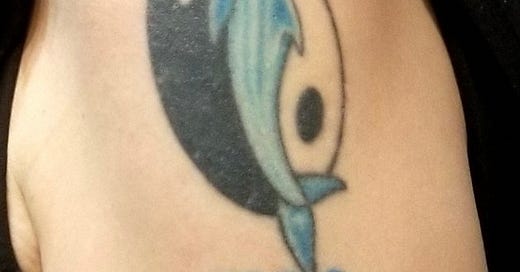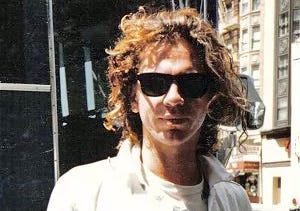A Discourse on Suicide: A Day Without Me, Stuck in a Moment and Walk On
Maddy Fry explores the quiet vein of grief, acceptance and release in U2's music around this most challenging of subjects
Warning: this article contains themes some readers may find upsetting
Suicide might seem an odd choice for an article about U2. It’s a subject that seems more suited to a newsletter about emo or thrash metal. The macabre is rarely U2’s wheelhouse, but this subject is still a quiet thread within their music. Bear with me—there’s hope to come.
While ruminating on this I went back to read the Niall Stokes book Into the Heart—the Stories Behind Every Song. I’d read somewhere else that “A Day Without Me'' was inspired by the 1980 suicide of Ian Curtis, the lead singer of Joy Division—although this might have just been in the air at the time. According to Stokes, however, the song was inspired by someone known to one of Bono’s friends who tried, and failed, to kill himself. As a result he was hospitalised, and a trip to visit him left its mark on the fledgling singer.
The song and its subject matter were playing on my mind for a reason. Last week, I was told by a friend that an acquaintance of one of his close friends had killed himself. He was middle-aged and in a stable relationship, with friends and hobbies. No one saw it coming.
It’s also been a year and a half since a close friend of mine lost her brother to a deliberate overdose, and ten years since a friend from my university days took his own life.
They were all men. They all had their issues, but the real depths of their torment was clearly hidden, as is so often the case. Clearly they couldn’t see a future without unbearable pain.
A month or two ago I also had a bizarre argument (alcohol may have been involved) with a friend about whether the state should not only legalise assisted dying, but actually help people kill themselves if they’ve exhausted every other avenue towards hope. He argued that it was a violation of the right to personal autonomy not to help someone make that final, irreversible choice. I countered that it was tantamount to saying people in serious mental distress were a burden on the state and not worth fighting for.
All this makes listening to a song narrated from the perspective of someone who not only tried, but succeeded, at doing the deed, rather eerie and sobering. “A Day Without Me” naturally creates a sense of distance between the narrator and the listener; the narrator is part of the world of the dead, looking in on our world, the realm of the living. According to Bono, it begs the question, “Would anything really change if I killed myself?” The song seems to imply that everyone else carries on (“wipe your eyes, and then let go”), particularly those who, in Stokes’ words, “haven’t shown up” to the funeral.
20 years later, “Stuck In a Moment” is very different, despite being a thematic twin to “A Day Without Me.” It’s almost painfully intimate, drawn from Bono’s grief over the loss of his friend Michael Hutchence, the INXS singer who hung himself in 1997. A slightly jarring part of Niall Stokes’ analysis is that Bono and Hutchence seemingly both described suicide as “pathetic,” as the epitome of the coward’s way out.
(Former INXS frontman Michael Hutchence. Source: Wikimedia Commons)
On the surface, it’s a bizarre sentiment in this day and age. Suicide, particularly among young men, is often in the news, and the language these days is bent far more towards compassion, not judgement. It chills me that in the country where I’m currently writing these words (the UK), suicide was a criminal offence until 1961. We live in a better world now, and I’m glad of it.
Yet, it also makes sense that “Stuck” is a song rooted in rage - a natural reaction if someone takes themselves away from you. That, and the realisation that it was a situation out of your control, even as you’re consumed by the guilt that comes from inevitably wondering whether you could have done more to prevent it.
Perhaps my suicide-positive friend’s point was that it’s selfish to demand that someone keep fighting a losing battle with their inner turmoil, simply for the sake of their loved ones—but “Stuck in a Moment” leaves no space for that. It makes you wonder if the people who didn’t make it to the funeral in “A Day Without Me” were consumed by anger rather than indifference.
In “Stuck in a Moment,” the person being told to “shed a tear, and let go” is the one wanting to end it all, rather than the friend who wants to talk him out of it (“you are such a fool, to worry like you do”). It’s brutal in how it leaves no room for self-pity (“these tears are going nowhere”).
Yet Bono didn’t want to write, in his words, “some stupid, sentimental, soppy fucking song;” he knew his friend, and “Stuck in a Moment” was a fitting swan song to a relationship where both sides didn’t pull any punches. As in life, so as in death.
It seems fitting to me that “Walk On” is on the same album. I include it here because even though it wasn’t inspired by suicide, it was part of my own journey away from despair.
School is nightmarish for lots of teens, but mine often felt like a hell reserved only for me, with each day consisting of bullying, loneliness, assault, and harassment. I felt like “Walk On” was written for me, but I knew at its heart, it was about endurance rather than self-pity.
Perhaps anyone trying to hang on to the feeling that life just might still be worth living needs both those songs—the slap to the face and the arm around the shoulder. Years ago I even heard about someone who had gotten the words “Walk On” tattooed over a scar from a suicide attempt. It stayed with me.
Many other fans have found solace in the song since (see below).
(A fan shows their tattoo inspired by “Walk On.” Source: U2 Tattoo Project)
It’s hard to know what to say to someone who goes through that kind of loss. Recently, I was told that the best question to ask is “What did they [your loved one] enjoy?”
I wonder if anyone ever asked Michael Hutchence’s friends and family that question. I decided to go and find out.
Apparently he liked poetry, literature, and spending time in his garden. Almost 27 years on from the loss of his friend, I hope Bono remembers that.
RIP.
© Fry / U2andUS (2024).





